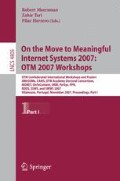Abstract
The classic definition of metadata is simply stated as data about data. Straightforward as it may be, this data can be very powerful. In this paper we will explore the possibility of how we can leverage metadata in a typical enterprise environment to produce efficiencies, increase data quality/confidence and improve business decision making. To set the stage we will briefly describe the environment depicted in the diagram below. Transactional systems will act as the source of data. As data flows down stream it often resides in a data warehouse, which supports Decision Support Systems (DSS). A data warehouse provides an analytical environment and acts as a repository for an organization’s historical data. From the warehouse the data lineage is continued as data marts are created down stream for specific reporting areas and as integration is built among the different analytical environments. The collection of data lineages, we will refer to as the Information Supply Chain (ISC). Metadata is the key enabler binding together the web of data in the ISC. This type of environment often presents a challenge - business users and system analysts struggle trying to fully understand the business rules, data lineage and business definitions of data terminologies. We propose using Object Role Modeling (ORM) to design and build a central metadata repository that supports the retention of data definitions and data lineage of the ISC plus other metadata properties required in a repository system to play an active role throughout the lifecycle of data from source to BI reporting. The metadata repository will hold the knowledge of the enterprise shareable systems and data and make it available at the conceptual level. We will leverage ORM and the centralized repository to produce the following key features:
-
Model and build a metadata management system
-
Extract metadata from ORM into the metadata repository
-
Explore metadata based automation of data mart schemas and ETL specifications
-
Automate the code generation of stored procedures and class objects based on metadata
Access this chapter
Tax calculation will be finalised at checkout
Purchases are for personal use only
Preview
Unable to display preview. Download preview PDF.
References
Marco, D.: Building and Managing the Meta Data Repository, pp. 4–5. Wiley, Chichester (2000)
Anahory, S., Murray, D.: Data Warehousing in the Real World, p. 4. Addison-Wesley, Reading (1997)
Wikipedia.org [Online] (July 25, 2007), available http://en.wikipedia.org/wiki/Datamart
Author information
Authors and Affiliations
Editor information
Rights and permissions
Copyright information
© 2007 Springer-Verlag Berlin Heidelberg
About this paper
Cite this paper
Shelstad, B., Hallock, P., Dela Cruz, N., Barden, D. (2007). Object Role Modeling Enabled Metadata Repository. In: Meersman, R., Tari, Z., Herrero, P. (eds) On the Move to Meaningful Internet Systems 2007: OTM 2007 Workshops. OTM 2007. Lecture Notes in Computer Science, vol 4805. Springer, Berlin, Heidelberg. https://doi.org/10.1007/978-3-540-76888-3_86
Download citation
DOI: https://doi.org/10.1007/978-3-540-76888-3_86
Publisher Name: Springer, Berlin, Heidelberg
Print ISBN: 978-3-540-76887-6
Online ISBN: 978-3-540-76888-3
eBook Packages: Computer ScienceComputer Science (R0)

